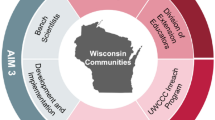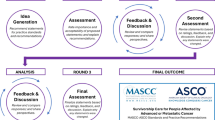Abstract
Approximately 11% of all new breast cancer cases in the USA occur in women aged 45 years or younger. In 2011, CDC funded seven organizations to develop or enhance programs for young breast cancer survivors (YBCS). This paper analyzed program evaluation data collected by one of these organizations to gain a more nuanced understanding of how recipients used the newly developed program and resources for YBCS. Sharsheret’s Thriving Again program was evaluated through a web-based survey of survivorship program participants. The evaluation asked questions about participant demographics, use of the kit’s survivorship care plan (SCP), satisfaction with the timing of survivorship kit receipt, and factors related to survivors’ use of additional Sharsheret programs. We conducted bivariate analyses of survey responses and calculated chi-square statistics for significance testing. Of the 163 women who responded to the survey, 43% were diagnosed with breast cancer at or before age 45 and 69% were of Jewish descent. The majority of women who used the SCP found it helpful to facilitate cancer treatment (94%), follow-up (85%), or discussions with providers (91%). A total of 75% of women who received the SCP kit while either recently diagnosed or undergoing treatment were satisfied with the timing of receipt. Survey respondents found the Thriving Again program and survivorship kit beneficial and indicated timing preferences for when to receive resources and support. Supporting the self-efficacy of cancer survivors may improve survivors’ quality of life and is an important aspect of survivorship programs.
Similar content being viewed by others
References
United States Department of Health and Human Services(2015) Centers for Disease Control and Prevention and National Cancer Institute, United States Cancer Statistics: 1999–2012 Incidence, WONDER Online Database
Anders CK, Johnson R, Litton J, Phillips M, Bleyer A (2009) Breast cancer before age 40 years. Semin Oncol 36:237–249
Partridge AH (2013) Cancer survivorship and the young breast cancer patient: addressing the important issues. Oncologist 18:e19–e20
Colleoni M, Anders CK (2013) Debate: the biology of breast cancer in young women is unique. Oncologist 18:e13–e15
Gnerlich JL, Deshpande AD, Jeffe DB, Sweet A, White N, Margenthaler JA (2009) Elevated breast cancer mortality in women younger than age 40 years compared with older women is attributed to poorer survival in early-stage disease. J Am Coll Surg 208:341–347
Buist DS, Abraham LA, Barlow WE, Krishnaraj A, Holdridge RC, Sickles EA, Carney PA, Kerlikowske K, Geller BM, Breast Cancer Surveillance Consortium (2010) Diagnosis of second breast cancer events after initial diagnosis of early stage breast cancer. Breast Cancer Res Treat 124:863–873
Centers for Disease Control and Prevention (2016) Bring Your Brave
Kent EE, Alfano CM, Smith AW, Bernstein L, McTiernan A, Baumgartner KB, Ballard-Barbash R (2013) The roles of support seeking and race/ethnicity in posttraumatic growth among breast cancer survivors. J Psychosoc Oncol 31:393–412
Gonçalves V, Sehovic I, Quinn G (2014) Childbearing attitudes and decisions of young breast cancer survivors: a systematic review. Hum Reprod Update 20:279–292
Canada AL, Schover LR (2012) The psychosocial impact of interrupted childbearing in long-term female cancer survivors. Psychooncology 21:134–143
Ernst J, Gotze H, Krauel K, Romer G, Bergelt C, Flechtner HH, Herzog W, Lehmkuhl U, Keller M, Brahler E, von Klitzing K (2013) Psychological distress in cancer patients with underage children: gender-specific differences. Psychooncology 22:823–828
Zebrack B, Hamilton R, Smith AW (2009) Psychosocial outcomes and service use among young adults with cancer. Semin Oncol 36:468–477
Partridge AH, Ruddy KJ, Kennedy J, Winer EP (2012) Model program to improve care for a unique cancer population: young women with breast cancer. J Oncol Pract 8:e105–e110
Centers for Disease Control and Prevention, Cooperative agreement to support young women diagnosed with breast cancer.
American College of Surgeons (2015) Cancer program standards: ensuring patient-centered care, Chicago
Petrovcic A, Petric G, Manfreda K (2015) The effect of email invitation elements on response rate in a web survey within an online community. Comput Hum Behav 56:320–329
Zillmann D, Schmitz A, Skopek J, Blossfield H-P (2014) Survey topic and unit nonresponse—evidence from an online survey on mating. Qual Quant 48:2069–2088
Hewitt M, Greenfield S, Stovall E (eds) (2006) From cancer patient to cancer survivor: lost in transition. National Academies Press, Washington, DC
Institute of Medicine (2006) From cancer patient to cancer survivor: lost in transition. National Academies Press, Washington, DC
Earle CC (2006) Failing to plan is planning to fail: improving the quality of care with survivorship care plans. J Clin Oncol 24:5112–5116
A.W. Boyes, A. Girgis, C. D'Este and A.C. Zucca (2012) Prevalence and correlates of cancer survivors’ supportive care needs 6 months after diagnosis: a population-based cross-sectional study, BMC Cancer 12
Keesing S, McNamara B, Rosenwax L (2015) Cancer survivors’ experiences of using survivorship care plans: a systematic review of qualitative studies. J Cancer Surviv 9:260–268
Earle CC, Ganz PA (2012) Cancer survivorship care: don’t let the perfect be the enemy of the good. J Clin Oncol 30:3764–3768
Parry C, Kent EE, Forsythe LP, Alfano CM, Rowland JH (2013) Can’t see the forest for the care plan: a call to revisit the context of care planning. J Clin Oncol 31:2651–2653
Miedema B, Easley J, Robinson LM (2013) Do current cancer follow-up care practices meet the needs of young adult cancer survivors in Canada? A qualitative inquiry. Curr Oncol 20:14–22
Klemanski DL, Browning KK, Kue J (2016) Survivorship care plan preferences of cancer survivors and health care providers: a systematic review and quality appraisal of the evidence. J Cancer Surviv 10:71–86
Jones JM, Cheng T, Jackman M, Rodin G, Walton T, Catton P (2010) Self-efficacy, perceived preparedness, and psychological distress in women completing primary treatment for breast cancer. J Psychosoc Oncol 28:269–290
K. Sheehan (2001) E-mail survey response rates: a review, Journal of Computer-Mediated Communicatoin 6
Kaplowitz MD, Hadlock TD, Levine R (2004) A comparison of web and mail survey response rates. Public Opinion Quarterly 68:94–101
Fan W, Yan Z (2010) Factors affecting response rates of the web survey: a systematic review. Comput Hum Behav 26:132–139
Acknowledgements
The authors acknowledge their coauthor and the founder of Sharsheret, Rochelle Shoretz, who died from complications of breast cancer on May 31, 2015. This article is dedicated to her memory for the passion and drive with which she created a community of support for Jewish women with breast cancer.
Author information
Authors and Affiliations
Corresponding author
Ethics declarations
Conflict of Interest
The authors declare that they have no conflict of interest.
Ethical Approval
The article does not contain any studies with animals performed by any of the authors. All procedures performed in studies involving human participants were in accordance with the ethical standards of the institutional and/or national research committee and with the 1964 Helsinki Declaration and its later amendments or comparable ethical standards.
Informed Consent
Secondary data for this evaluation study were derived from a previously fielded program evaluation survey. Original participant consent was assumed by response to the evaluation survey.
Disclosures
The authors have no disclosures to report.
Disclaimer
The findings and conclusions in this report are those of the authors and do not necessarily represent the official position of the Centers for Disease Control and Prevention.
Rights and permissions
About this article
Cite this article
Rohan, E.A., Townsend, J.S., Fleischmann, A. et al. “When I Needed It”: Evaluation of the Use and Timing of Sharsheret’s Thriving Again Program for Young Breast Cancer Survivors. J Canc Educ 33, 976–982 (2018). https://doi.org/10.1007/s13187-017-1178-7
Published:
Issue Date:
DOI: https://doi.org/10.1007/s13187-017-1178-7




